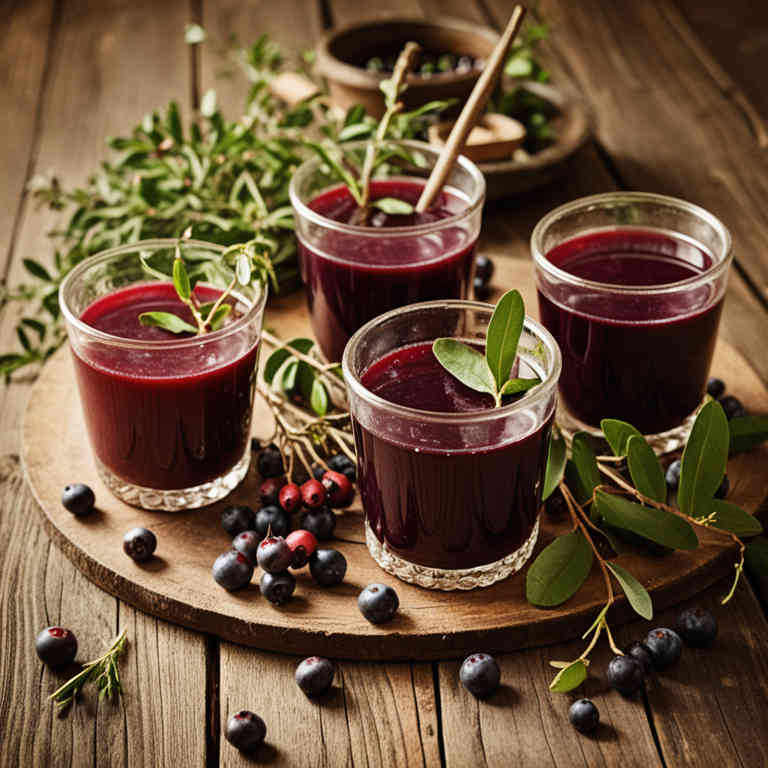Vaccinium myrtillus juice for medicinal use

Vaccinium myrtillus juice is a preparation derived from the berries of the common blueberry plant, which is native to Europe and parts of North America.
This juice is rich in antioxidants, vitamins, and minerals, making it valuable in herbal medicine for its potential health benefits. In herbalism, it is often used to support urinary tract health and may help alleviate symptoms of inflammation and infection. It is also believed to have a mild diuretic effect, which can aid in detoxification processes.
Due to its nutrient density, it is sometimes used as a natural supplement to boost overall wellness and immune function.
Uses
Vaccinium myrtillus juice has been used to treat various ailments for centuries, particularly in traditional medicine practices across Northern Europe.
Historically, it was valued for its potential to alleviate symptoms of colds, flu, and respiratory infections due to its high antioxidant and anti-inflammatory properties. In traditional herbalism, the juice was also used to support digestive health and as a natural remedy for skin conditions. Modern research has begun to explore its potential in managing oxidative stress and supporting immune function, though more studies are needed to confirm these benefits.
Today, it is sometimes used in complementary and alternative medicine, though its efficacy remains a subject of ongoing scientific investigation.
Benefits
Vaccinium myrtillus juice has health benefits such as boosting the immune system, reducing inflammation, and supporting digestive health.
It is rich in antioxidants, which help neutralize free radicals in the body and may lower the risk of chronic diseases. The juice also contains anti-inflammatory compounds that can aid in managing conditions like arthritis and other inflammatory disorders. Additionally, it has been traditionally used to support respiratory health and may help alleviate symptoms of colds and coughs.
Overall, Vaccinium myrtillus juice is a natural remedy that offers a range of health-promoting properties.
Constituents
Vaccinium myrtillus juice active constituents include anthocyanins, proanthocyanidins, flavonoids, and polyphenols.
These compounds are known for their strong antioxidant properties, which help neutralize free radicals in the body. The presence of these bioactive compounds may support cardiovascular health by improving blood vessel function and reducing oxidative stress. Additionally, the juice may have anti-inflammatory effects, potentially benefiting conditions like arthritis or metabolic syndrome.
It is also believed to support immune function and may aid in the prevention of chronic diseases.
Preparation
To make Vaccinium myrtillus juice, start by harvesting fresh blueberries, ensuring they are ripe and free from pesticides.
Wash the berries thoroughly under running water to remove any dirt or residue. Next, blend the cleaned blueberries with a small amount of water or a natural sweetener like honey until a smooth mixture is achieved. Strain the mixture through a fine mesh sieve or cheesecloth to remove seeds and pulp.
Finally, store the juice in a sealed container in the refrigerator for up to 3 days or freeze for longer preservation.
Side Effects
Vaccinium myrtillus juice may lead to gastrointestinal discomfort, including nausea, vomiting, and diarrhea, especially when consumed in large quantities.
It can also cause allergic reactions in individuals sensitive to the plant, manifesting as rash, itching, or difficulty breathing. Prolonged use may result in liver toxicity due to the presence of certain compounds. The juice may interact with medications, particularly those affecting the liver or blood clotting.
It is advisable to consult a healthcare professional before using this preparation, especially for individuals with pre-existing health conditions.